Medical expert of the article
New publications
Preparations
Arrhythmia pills
Last reviewed: 03.07.2025

All iLive content is medically reviewed or fact checked to ensure as much factual accuracy as possible.
We have strict sourcing guidelines and only link to reputable media sites, academic research institutions and, whenever possible, medically peer reviewed studies. Note that the numbers in parentheses ([1], [2], etc.) are clickable links to these studies.
If you feel that any of our content is inaccurate, out-of-date, or otherwise questionable, please select it and press Ctrl + Enter.
Indications arrhythmia pills
Anti-arrhythmia pills can only be prescribed by a cardiologist after the patient has undergone a full examination. This disease is primarily treated with popular medications, although therapy should also include a special diet. In some cases, treatment with pills helps to completely get rid of arrhythmia, but most often they are only a preparatory stage for more serious methods of therapy.
In what cases can a doctor prescribe pills? If the patient has the following symptoms:
- A feeling of fluttering of the heart in the chest without any particular reason.
- Pain and increased heart rate may occur intermittently.
- The heart rate may be slow in some cases.
- Pain in the chest area.
- Fatigue, shortness of breath.
Release form
Anti-arrhythmia medications can be divided into four main groups:
- Beta blocker
- Calcium channel blocker: prevents calcium ions from entering the cell.
- Potassium channel blocker.
- Sodium channel blocker.
The most commonly used tablets for arrhythmia are:
- Concor.
- Anaprilin.
- Egilok.
- Metoprolol.
- Bisoprolol.
- Verapamin.
- Amlodipine.
- Amlodak.
- Amiodarone.
- Cordarone.
- Xicaine.
- Mexiletine.
Concor
Tablets containing the active substance bisoprolol gemifumag. The drug is often used not only to treat arrhythmia, but also as a therapy for stable angina, arterial hypertension and chronic heart failure.
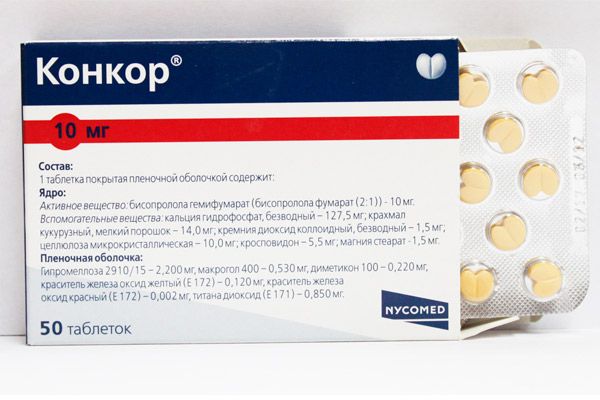
Take one tablet once a day with a sufficient amount of liquid. It can be taken both on an empty stomach and after meals. As a rule, the therapy is quite long-term.
Patients with acute heart failure, sinoatrial block, bradycardia, low blood pressure, bronchial asthma, Raynaud's disease, pheochromocytoma, metabolic acidosis and intolerance to bisoprolol hemifumag are prohibited from taking Concor tablets. They are also contraindicated for people under eighteen years of age.
Quite often, after taking Concor, patients experience the following symptoms: dizziness, bradycardia, headaches, numbness in the extremities, loss of consciousness, sleep disturbances, depression, vomiting, nausea, diarrhea, muscle cramps, asthenia, allergies.
Anaprilin
A popular antiarrhythmic non-selective beta-blocker that has antianginal, antihypertensive, antiarrhythmic effects. The drug contains propranolol. The dosage is prescribed by the attending physician individually, based on the severity of the disease and the patient's condition. But a single dose should not exceed 80 mg of the drug. It is very important to split the intake into two or three times a day.
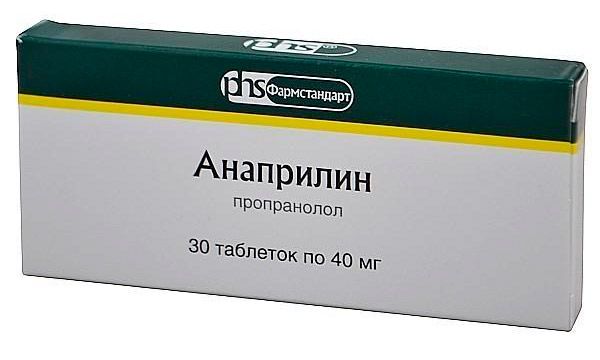
Patients with sinoatrial block, second and third degree AV block, bradycardia, chronic heart failure, cardiogenic shock, and intolerance to propranolol are prohibited from taking the tablets.
In some patients, taking Anaprilin is accompanied by the appearance of the following symptoms: weakness, fatigue, insomnia, nervousness, depression, dry eyes, vomiting, diarrhea, taste changes, bronchospasms, thrombocytopenia, allergies.
 [ 13 ], [ 14 ], [ 15 ], [ 16 ]
[ 13 ], [ 14 ], [ 15 ], [ 16 ]
Egilok
Popular tablets for arrhythmia, which contain the active substance metoprolol tartrate.
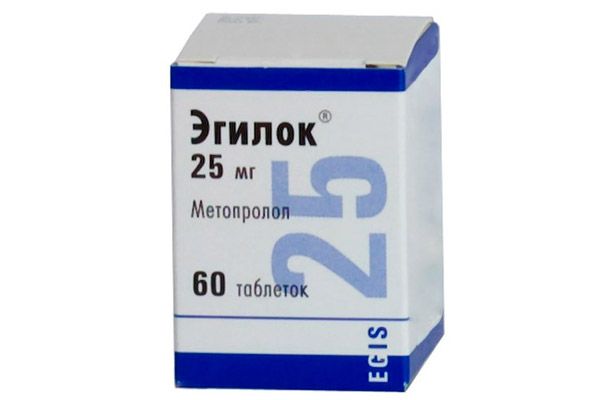
Take during or after meals. If necessary, the tablet can be broken to take half the dose. The dosage is selected individually by the attending physician to avoid the possibility of the patient developing bradycardia. Do not take more than the maximum daily dose (200 mg).
Patients with cardiogenic shock, sinoatrial block, bronchial asthma, bradycardia, pheochromocytoma, intolerance to metoprolol are prohibited from taking the drug. There is no clinical data on the effect of the drug on patients under 18 years of age.
As a rule, Egilok tablets are tolerated by patients quite well. Unpleasant symptoms from taking them are expressed extremely rarely. Sometimes patients experience severe fatigue, bradycardia, paresthesia, anxiety, shortness of breath, nausea, allergies, decreased sexual desire, arthralgia.
 [ 17 ]
[ 17 ]
Metoprolol
A popular beta-blocker, which contains the active substance metoprolol tartrate. It is prescribed for the treatment of arrhythmia, coronary heart disease, arterial hypertension, hyperthyroidism, and for the prevention of migraines.
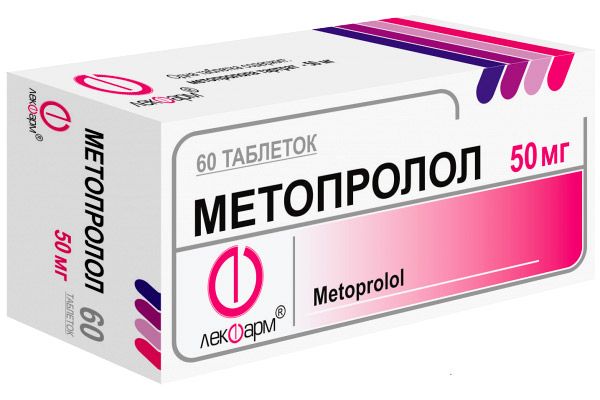
Metoprolol tablets are taken during or after meals. It is recommended to wash down the drug with a sufficient amount of water. At first, patients are prescribed 1-2 tablets twice a day, if there is no therapeutic effect, the dose is increased. Do not exceed the established maximum daily dose (200 mg).
Patients with cardiogenic shock, bradycardia, weak sinus syndrome, heart failure, Prinzmetal's angina, arterial hypertension, metoprolol intolerance are prohibited from taking the tablets. They are also contraindicated for patients under 18 years of age and breastfeeding women.
The occurrence of unpleasant symptoms during the intake of Metoprolol is associated with the individual sensitivity of each patient. Sometimes the following may appear: tinnitus, visual impairment, weakness, depression, impaired attention, conjunctivitis, vomiting, abdominal pain, headaches, allergies.
Bisoprolol
A popular antiarrhythmic drug that contains bisoprolol fumarate. It is also used to treat angina, especially during attacks.
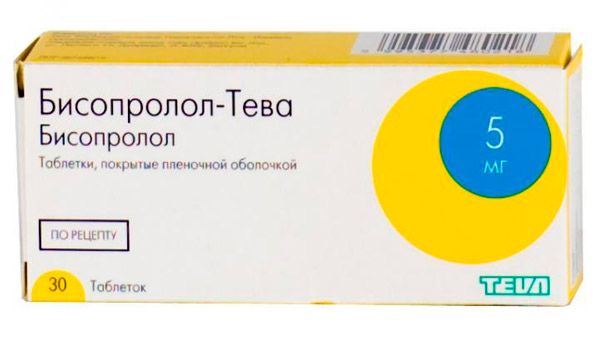
The initial dose of Bisoprolol is 5 mg per 24 hours. The tablet should be taken before breakfast with a sufficient amount of liquid. If necessary, the attending physician may increase the daily dose to 10 mg.
Patients with cardiogenic shock, collapse, pulmonary edema, chronic heart failure, sinoatrial block, bradycardia, Prinzmetal's angina, cardiomegaly, bronchial asthma, metabolic acidosis, and intolerance to bisoprolol are prohibited from taking the tablets.
Quite often after taking Bisoprolol, patients experience diarrhea, headaches, insomnia, depression, weakness and fatigue, conjunctivitis, chest pain, liver and kidney dysfunction, hyperglycemia, allergies, fetal bradycardia, fetal growth retardation, and increased sweating.
 [ 18 ], [ 19 ], [ 20 ], [ 21 ]
[ 18 ], [ 19 ], [ 20 ], [ 21 ]
Verapamil
A popular calcium channel blocker, which contains the active substance verapamin hydrochloride. It has antihypertensive, antiarrhythmic and antianginal effects. Reduces myocardial oxygen demand.

The dosage and duration of treatment are prescribed individually by the attending physician. The drug is often used as a preventive measure against arrhythmia and angina. In this case, patients are prescribed 80 mg of the drug three times a day.
Patients with cardiogenic shock, bradycardia, sick sinus syndrome, Morgagni-Adams-Stokes syndrome, Wolff-Parkinson-White syndrome, heart failure and verapamin intolerance are prohibited from taking the drug. Quite rarely, patients may experience the following unpleasant symptoms after taking Verapamil tablets: headaches, dizziness, vomiting, nausea, facial flushing, bradycardia, constipation, allergies, peripheral edema.
Amlodipine
A popular drug from the group of calcium channel blockers. The active ingredient is amlodipine in the form of besylate, which is 10 mg in one tablet.
Taken on an empty stomach or after meals. Initially, the dose is 5 mg of the drug every 24 hours. Over seven to fourteen days, the dose is gradually increased to 10 mg per day. Do not exceed the maximum daily dose (10 mg).
Patients with collapse, bradycardia, unstable angina, arterial hypertension, and intolerance to amlodipine are contraindicated to take the drug. This drug is also prohibited for patients under 18 years of age and pregnant women.
Quite often, after taking the drug, patients experience side effects: dizziness, increased heart rate, headaches, swelling, abdominal pain, nausea, tachycardia, pollakiuria, arthralgia, xeroderma, allergies, conjunctivitis.
 [ 22 ], [ 23 ], [ 24 ], [ 25 ], [ 26 ]
[ 22 ], [ 23 ], [ 24 ], [ 25 ], [ 26 ]
Amlodak
A drug from the group of selective calcium channel blockers. The composition of Amlodak tablets can contain a substance derived from dihydropyridine.
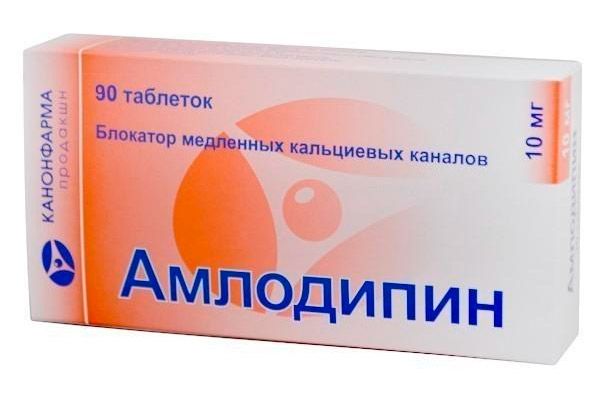
At the initial stages of therapy, the attending physician usually prescribes a minimum dose of 5 mg once a day. Within a week, the dose is increased to 10 mg per day. Do not exceed the maximum possible daily dose of 10 mg.
Patients with dihydropyridine intolerance and well-defined arterial hypertension should not take Amlodak tablets. It has not been established whether the drug is safe to take during pregnancy and breastfeeding.
In some patients, taking the drug may lead to the following side effects: headaches, peripheral edema, drowsiness, excessive fatigue, arrhythmia, shortness of breath, skin hyperemia, paresthesia, allergies, pain in the extremities.
 [ 27 ]
[ 27 ]
Amiodarone
A popular antiarrhythmic drug, which contains the active substance amiodarone hydrochloride. The drug is a repolarization inhibitor. It also has a pronounced coronary vasodilator, antianginal and thyrotropic effect.
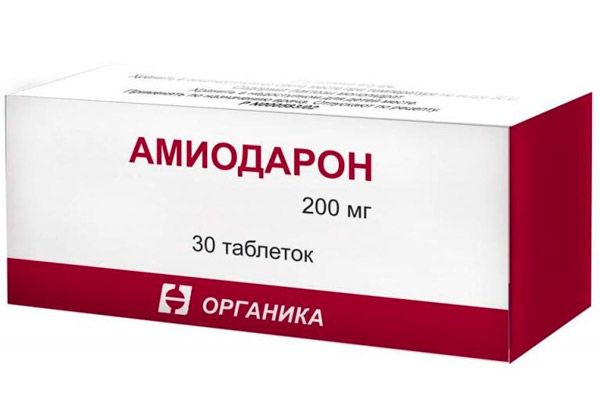
As a rule, it is prescribed for the treatment of severe ventricular arrhythmia, as well as supraventricular and atrial fibrillation. The dose and duration of treatment are determined and adjusted (if necessary) by a specialist. Tablets are taken before or after meals, washed down with a sufficiently large amount of liquid.
Amiodarone tablets have many contraindications that should be carefully studied before taking the drug. Patients with sick sinus syndrome, atrioventricular block, arterial hypertension, hyper- and hypothyroidism, hypokalemia, hypomagnesemia, interstitial lung diseases, intolerance to amiodarone, lactose or iodine are completely prohibited from taking the drug. It also cannot be used to treat patients under 18 years of age. Pregnant women should not take it, as the drug contains iodine.
Side effects often occur in patients taking Amiodarone: moderate bradycardia, vomiting, taste disturbances, acute toxic hepatitis, pneumonitis, acute respiratory syndrome with fatal outcome, photosensitivity, tremor, allergy.
Cordarone
The composition of the drug with antiarrhythmic action is the active substance amiodarone hydrochloride. The drug is taken only as prescribed by a specialist. In this case, the dosage and duration of therapy are individual. There is a loading and maintenance dose. Do not exceed the maximum possible daily dose of 400 mg.
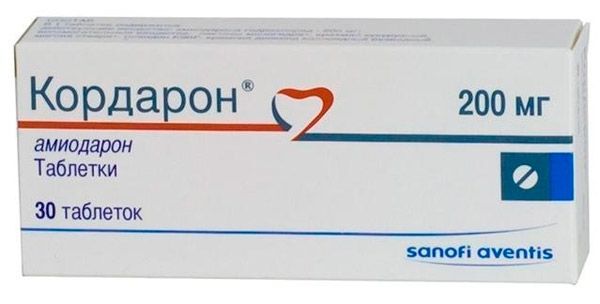
Patients with hypomagnesemia, hypokalemia, sinus bradycardia, thyroid dysfunction, interstitial lung diseases, iodine intolerance, amiodarone or lactose intolerance are prohibited from using the drug. It should also not be taken by patients under 18 years of age, during pregnancy and breastfeeding.
Very often, patients who take Cordarone tablets for arrhythmia may experience the following side effects: bradycardia, dysgeusia, vomiting, chronic liver disease (sometimes fatal), bronchospasm, hypothyroidism, photosensitivity, epididymitis, Quincke's edema.
Mexiletine
In its chemical structure, this drug is similar to lidocaine in its pharmacological characteristics. It is a popular antiarrhythmic drug, which is included in class IB. It is used to treat various heart rhythm disorders.
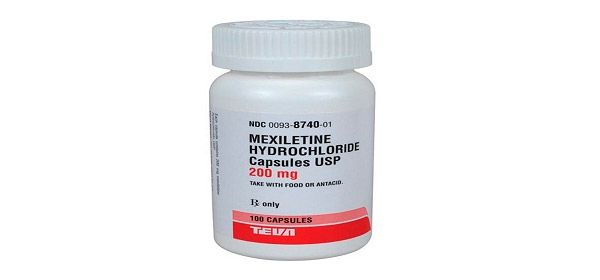
At first, the drug is used in the form of injections. After the necessary therapeutic effect is achieved, they switch to Mexiletine tablets. They are swallowed whole, washed down with a sufficient amount of water. At first, two tablets (400 mg) are taken once every six to eight hours, after the patient's condition improves, the dose is reduced to one tablet every six to eight hours.
Patients with weakness of the sinus node, bradycardia, hypotension, heart failure, liver or kidney failure, intolerance to mexiletine should not take tablets. Not prescribed to pregnant and breastfeeding women.
With prolonged use of Mexiletine, some patients experience changes in taste sensations, nystagmus, vomiting, visual acuity disturbances, ataxia, paresthesia, tremor, confusion, drowsiness, and allergies.
Pills for atrial fibrillation
One of the popular drugs for the treatment of atrial fibrillation are Quinidine tablets. They have a well-defined antiarrhythmic effect.
For the treatment of adult patients, the minimum dose (no more than 0.3 g) is initially prescribed. This will help to determine how sensitive the patient's body is to the substance quinidine. If necessary, the dose can be increased to 0.4 g once every six hours. If the therapeutic effect is not achieved, 0.2 g of the drug is added every 60 minutes until the paroxysm stops.
To treat frequent attacks of ventricular arrhythmia, it is necessary to take Quinidine tablets at 0.4 g every three hours.
Patients with thrombocytopenic purpura, hypersensitivity, glycoside intoxication, cardiogenic shock, myasthenia are prohibited from taking Quinidine. Pregnant and breastfeeding women should use it with extreme caution.
The following symptoms may occur when taking the drug: headaches, tinnitus, dizziness, hemolytic anemia, poor appetite, vomiting, constipation, diarrhea, sinus bradycardia, quinidine shock, allergy.
Tablets for sinus arrhythmia
Sinus arrhythmia is a disease that is almost always asymptomatic. If this type of arrhythmia is not combined with another, more serious type of rhythm disorder, then no treatment is required. In some cases, a cardiologist may prescribe therapy based on taking sedatives. As a rule, tablets for sinus arrhythmia are medicines based on herbal extracts.
If vagotonia is severe, the patient can take Atropine Sulfate. The standard dose is 300 mg every four to six hours. If the patient suffers from glaucoma and obstructive diseases of the gastrointestinal tract, atropine sulfate is contraindicated. The following side effects may occur during treatment: a feeling of dry mouth, mydriasis, increased heart rate, difficulty urinating, atonic constipation, vertigo, headaches. High blood pressure tablets for arrhythmia
If the patient's arrhythmia is accompanied by high blood pressure, complications may develop in the form of myocardial ischemia, negative neurological. It is very important to reduce blood pressure during arrhythmia. The following tablets are used for this:
- Hydrochlorothiazide - each tablet contains 25 mg of hydrochlorothiazide. Take one or two tablets once every 24 hours. Patients with arterial hypertension, edema syndrome, glaucoma, diabetes insipidus are prohibited from taking. The tablets can disrupt the electrolyte balance, lead to headaches, drowsiness, dizziness, paresthesia and allergies.
- Indapamide is a popular diuretic. It is best to take it in the morning on an empty stomach with a sufficient amount of liquid. Do not exceed the maximum dose - 1 tablet per 24 hours. Do not take it in patients with galactosemia, renal failure, hypokalemia, encephalopathy, lactose intolerance, during pregnancy. Taking it can cause nausea, headaches, nocturia, pharyngitis, anorexia, loss of appetite, allergies.
Pharmacodynamics
Let's consider the pharmacodynamics and pharmacokinetics of tablets for arrhythmia using the popular drug "Concor" as an example.
It is a selective beta1-adrenoblocker. It has a membrane-stabilizing effect and negative inotropic effect. After taking Concor tablets, they help reduce the heart rate, reduce its stroke volume, and reduce the left ventricular ejection fraction. The maximum therapeutic effect is observed three to four hours after taking.
Pharmacokinetics
Immediately after administration, bisoprolol, which is part of Concor, is completely (90%) absorbed from the stomach. 30% of the substance binds to plasma proteins. Metabolites are excreted through the kidneys. 50% of bisoprolol is excreted unchanged through the kidneys. The remaining 50% is metabolized in the liver.
Use arrhythmia pills during pregnancy
Anti-arrhythmia tablets are used extremely rarely for the treatment of pregnant women and only under the careful supervision of the attending obstetrician-gynecologist. If the drug contains iodine, its use during pregnancy is completely prohibited, as it can harm the development of the fetus. When using anti-arrhythmia tablets, it is necessary to constantly monitor the blood flow in the placenta. If a negative effect on the fetus is noticed, alternative therapeutic measures should be used.
Contraindications
- Heart failure (acute).
- Cardiogenic shock.
- Decompensation stage of chronic heart failure.
- Sinoatrial block.
- Low blood pressure.
- Bradycardia.
- Bronchial asthma (severe).
- Pheochromocytoma.
- Patients under 18 years of age.
- Metabolic acidosis.
- Intolerance to components.
Overdose
Most often, when overdosing on antiarrhythmia pills, patients experience the following symptoms: bradycardia, increased blood pressure, bronchospasms, acute heart failure, hypoglycemia. For treatment, it is necessary to immediately stop taking the drug and begin special therapy (prescribed by a specialist).
Interactions with other drugs
The tolerability and effectiveness of arrhythmia pills may be affected by other medications. Among the most popular non-recommended combinations are:
- Arrhythmic drugs that belong to class I (Disopyramide, Quinidine, Flecainide, Propafenone) can worsen heart function.
- Diltiazem together with Concor may lead to deterioration of AV conduction.
- Together with MAO inhibitors, the hypotensive effect of blockers may be enhanced.
Attention!
To simplify the perception of information, this instruction for use of the drug "Arrhythmia pills" translated and presented in a special form on the basis of the official instructions for medical use of the drug. Before use read the annotation that came directly to medicines.
Description provided for informational purposes and is not a guide to self-healing. The need for this drug, the purpose of the treatment regimen, methods and dose of the drug is determined solely by the attending physician. Self-medication is dangerous for your health.

